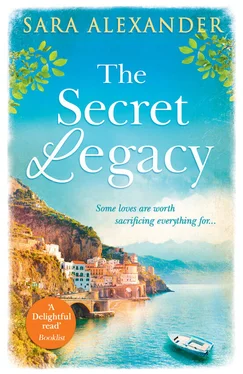SARA ALEXANDERattended Hampstead School, went on to graduate from the University of Bristol, with a BA hons in Theatre, Film & TV. She followed on to complete her postgraduate diploma in acting from Drama Studio London. She has worked extensively in the theatre, film and television industries, including roles in much loved productions such as Harry Potter and the Deathly Hallows , Doctor Who , and Franco Zeffirelli’s Sparrow . She is based in London.
Copyright
An imprint of HarperCollins Publishers Ltd
1 London Bridge Street
London SE1 9GF
First published in Great Britain by HQ in 2018
Copyright © Sara Alexander 2018
Sara Alexander asserts the moral right to be identified as the author of this work.
A catalogue record for this book is available from the British Library.
This novel is entirely a work of fiction. The names, characters and incidents portrayed in it are the work of the author’s imagination. Any resemblance to actual persons, living or dead, events or localities is entirely coincidental.
All rights reserved under International and Pan-American Copyright Conventions. By payment of the required fees, you have been granted the non-exclusive, non-transferable right to access and read the text of this e-book on-screen. No part of this text may be reproduced, transmitted, downloaded, decompiled, reverse engineered, or stored in or introduced into any information storage and retrieval system, in any form or by any means, whether electronic or mechanical, now known or hereinafter invented, without the express written permission of HarperCollins.
Ebook Edition © August 2018 ISBN: 9780008273699
To Stefan, for planting the seed
Contents
Cover
About the Author
Title Page
Copyright
Dedication
POSITANO AMALFI COAST ITALY: 2005
1949
CHAPTER 1
CHAPTER 2
CHAPTER 3
CHAPTER 4
CHAPTER 5
CHAPTER 6
CHAPTER 7
CHAPTER 8
CHAPTER 9
CHAPTER 10
CHAPTER 11
CHAPTER 12
CHAPTER 13
CHAPTER 14
CHAPTER 15
CHAPTER 16
CHAPTER 17
CHAPTER 18
CHAPTER 19
CHAPTER 20
CHAPTER 21
CHAPTER 22
CHAPTER 23
CHAPTER 24
CHAPTER 25
CHAPTER 26
1976
CHAPTER 27
CHAPTER 28
CHAPTER 29
CHAPTER 30
CHAPTER 31
CHAPTER 32
POSITANO: 2005
READING GROUP GUIDE
ACKNOWLEDGEMENTS
About the Publisher
POSITANO AMALFI COAST ITALY
2005
I ought to be glad I can afford home help. The lady in question takes to my dishes with an Eastern European verve that never fails to convince me that, to her, cooking is punishment. What those blessed vegetables, reared by our own hands, might have done to her is beyond me. Her impatience is tangible, even from here on the upper terrazzo beyond the kitchen. I can smell it in the bitter aroma of parsley crushed with too heavy a hand and the acidic odor of almost singed garlic hitting the back of my throat. I’ve lost count of how many times I have pleaded with her to not massacre the pasta, that to feed a Neapolitan woman wet mush will find her in the dock for manslaughter. Bad food kills. It’s loneliness on a plate; dishes made without love are venom. I will not hear otherwise. She’s arguing with the pot now, the water is boiling too fast. It’s overflowed. At the three-minute mark as usual.
Not that my neighbors don’t jump at the chance to come and take tea of an afternoon – every day in fact, since I decided to terminate my treatment. They sit beside me, each one believing that they are my true confidante, the sole keeper of my darkest secrets. They think I don’t notice the way they take in the high ceilings above my terraces or the green mist that wafts across them as they survey the riches bestowed to me, Santina Guida, no more than a peasant from the hills. They think I don’t see them wonder how a street urchin ended her life in this palace. They picture their lives in this place after I’ve gone; I see it in the way their eyes linger on my lower garden terrazzo, in the masked longing as they drink in the view of the coast framed by the columns supporting the terraces above. The way their hands linger just a little too long upon the waxed furniture. There are those with complicated families, more worthy than I of this vast home, those who have struggled their entire lives just to place bread upon the table, the ones who have been there for me as I trawled through the endless paperwork after the Major died. Each and every one of them is worthy of this home – perhaps this is a truth. But whose truth? They think I’m tired because cancer is winning. But I am tired of doing what is right, just, expected – so very tired of that.
She and I eat the wallpaper paste disguised as linguine con zucchini. She didn’t drain the zucchini with salt then wring out the excess water beforehand and thinks I don’t notice. On the contrary, I simply choose not to point it out for the hundredth time. Even old women get sick of their own voices.
After coffee – I use the term with trepidation, I know few people partial to boiled water with the memory of flavor – she clears up and helps me get dressed. I’m wearing the dress the Major had made for me. It still fits. The pleasure of this simple thing has not evaporated. A little vanity is not wasted on the dying. I can see my skin is powder white. I still don’t recognize the whisper of a person in the mirror. I know that if I live only another few days or weeks or months, this afternoon will be the most important hours of my final days.
My lawyer Antonino is waiting for me. He’ll try to convince me to abandon my decision. He’ll blame the treatment, or lack of it, on my apparent sudden change of heart. He won’t know it is a decision I have not had the strength to make for years, a decision that has been eating away at my heart since it all began.
‘You’re quite sure, Signora Guida?’ Antonino asks, looking at me with condescending compassion over the rim of his glasses.
I flash him a winning smile. His eyes, even more patronizing, crinkle as if sunk into parchment.
‘Antonino, I thank you from the bottom of my heart for showing such an interest in my affairs.’ My sarcasm is so well disguised he will mistake it for genuine politeness; men like him always do. ‘But I assure you that I have not taken this decision lightly.’
He nods. He doesn’t believe me, that much is clear. I care little for his opinion, but I need to make sure that what he says he’s writing down is my request, not his. He turns the page around to me and hands me a heavy fountain pen – I can see where his greedy fees are spent. I sign below my name, trying to ignore the wash of memories swirling through my mind like droplets of black ink in water. He passes the document to my Eastern European nurse, who, as my witness, lays down her own scrawl. It is done.
We walk home slowly. I refuse a taxi. I’d like to stifle the presentiment that this is my last climb of those four hundred and forty steps back up to the villa from the shore. We stop beneath the Virgin Mary statue placed inside a carved-out arch in the rock, a little way past the string of boutiques off Via Cristoforo Colombo. Both the votive candle’s flame and I dance the precarious flicker between light and dark. Svetlana grips my arm a little tighter. She can feel my legs ever more unsteady. I nod when I’ve found my last reserves of strength.
Time was I sprinted these stone steps two at a time, like all respectable Positanese. I have no memory of breaking a sweat even, not like these camera-laden Americans who come to commit my town to over-exposed memory. Now I am old indeed, with memories charging back of my fishing village, a huddle of homes sparse along the shingle. The fishermen keeping us all afloat until the brutal winters would leave us cut off from neighboring towns. That world almost feels imagined now: the laundry house churning through washing with the water gushing down the streets to the sea, the mill in the center of town cranking the flour. The sea was the brutal legend of invaders, the undulating history of all those rampant Greek creatures who haunt the tiny islands off our coast. Capri was the ancient seat of cantankerous Roman emperors, not lined with expensive retreats and starlets. Yes, I really am very old now.
Читать дальше












